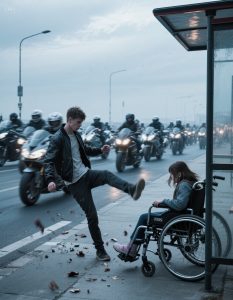
When a teenage bully kicked a disabled girl to the ground at a bus stop in Cedar Falls, Iowa, he thought no one would care. But moments later, the thunder of nearly a hundred motorcycles filled the air—and justice came roaring his way.
It was a cold Friday morning on Maple Street. The bus stop was crowded with sleepy students scrolling through their phones, waiting for the school bus to appear. Among them stood Lily Thompson, a quiet sixteen-year-old girl who wore a leg brace after a devastating car accident two years earlier. She was shy but kind, always offering a gentle smile to those who noticed her.
As Lily waited, a boy named Jason Miller, notorious for his cruel sense of humor, swaggered up with a smirk. “Move it, tin leg!” he sneered, shoving her backpack. Lily tried to ignore him, gripping her crutches tighter. Then, without warning, he kicked the side of her brace—sending her sprawling onto the pavement. A few teens snickered.
But the laughter didn’t last.
The low, growing rumble of engines filled the morning air. Heads turned. Down the street came a long line of motorcycles—chrome flashing, exhausts roaring, sunlight glinting off leather and steel. The convoy slowed and stopped right at the bus stop. On the backs of their vests, bold white letters read: “Guardians of Justice.”
A tall man with a gray beard and kind, steady eyes dismounted and removed his helmet. His name was Jack Reynolds. He crouched beside Lily, voice gentle but firm. “You okay, sweetheart?”
Lily nodded shakily, brushing tears from her cheeks.

Then Jack turned to Jason. His tone changed—calm, but ice-cold. “Was it you?”
Jason froze. The street fell silent except for the idling engines. Behind Jack, nearly a hundred bikers stood shoulder to shoulder—a wall of leather and silent judgment.
“Apologize,” Jack said. “Now.”
Jason stammered, pale-faced. “I—I didn’t mean—”
“Yes, you did,” Jack cut in. “So make it right.”
Under the weight of a hundred stares, Jason helped Lily up and muttered a trembling apology. The bikers didn’t leave until Lily was safely seated on the bus, waving at them through the window. The sound of their engines followed her all the way to school.
By lunchtime, the story had already exploded online. A student’s video of the incident—showing the moment the bikers arrived and Jason’s terrified face—went viral. Within hours, it had racked up over two million views. The hashtag #BikersForLily was trending nationwide.
Local news stations picked it up. Interview requests poured in. People across the country began sharing the story of how a group of strangers stood up for a girl no one else had helped. “It’s not about revenge,” Jack Reynolds told one reporter. “It’s about respect. You don’t stay silent when cruelty happens right in front of you.”
For Lily’s parents, who had spent months worrying about her confidence and loneliness, the transformation was almost immediate. For the first time in years, Lily’s smile reached her eyes again. “They made me feel like I mattered,” she said quietly. “Like there’s still kindness in the world.”
The following week, the bikers returned—not to intimidate, but to escort Lily to school as part of a charity ride against bullying. Dozens of townspeople joined them, waving flags as the motorcycles thundered through Cedar Falls. The sound that once scared her now meant safety, unity, and strength.
As for Jason Miller, his punishment wasn’t just suspension—it was shame. His classmates avoided him, and his parents required him to volunteer at a rehabilitation center for disabled children. Months later, Jason posted a public apology:
“I thought being cruel made me strong. Now I know real strength is standing up for others, not putting them down.”
When asked if she forgave him, Lily simply said, “Everyone deserves a chance to change. But neither of us will ever forget that day.”
Months passed, but the story of the girl and the 99 bikers spread far beyond their small town. Donations poured into the Guardians of Justice Foundation, funding anti-bullying programs across the country. Schools invited them to speak about courage, empathy, and the power of doing what’s right.
Lily, now more confident, began volunteering with the group. She often rode on the back of Jack’s motorcycle during charity events, waving to children and sharing her story. “If they hadn’t stopped that day,” she said during one school assembly, “I might have stopped believing in people.”
The bikers weren’t heroes in the comic book sense. They were veterans, mechanics, truck drivers, mothers and fathers—ordinary people who refused to look away. They lived by one simple rule: “If you can help, you do.”
One warm evening, as the sun dipped low over the Iowa fields, Jack looked at Lily and smiled. “You know, kid,” he said, “you gave us more than we ever gave you. You reminded us why we ride.”
The story inspired documentaries, talk shows, even a children’s book about kindness and courage. But in Cedar Falls, it wasn’t the fame that mattered—it was how that single moment changed their town.
The same bus stop that once echoed with cruelty became a symbol of compassion. A small bronze plaque was later placed there. It read:
“In honor of those who chose courage over silence.
Guardians of Justice, 2024.”
Today, Lily Thompson is studying to become a social worker. She still walks with her brace—but with her head held high. And sometimes, when she hears the distant rumble of motorcycles, she smiles. Somewhere out there, someone’s being protected by people who refuse to look away.
And for everyone who read her story, one question still lingers:


